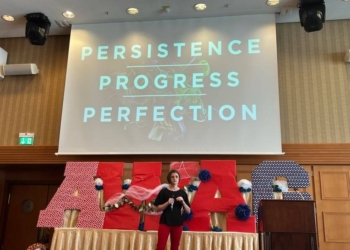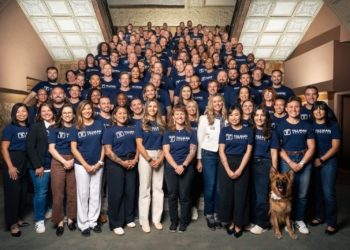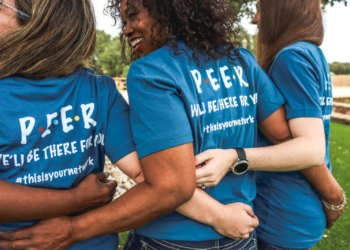For 1.1 million caregivers of post-9/11 veterans, the war comes home with the service member.
Those caring for veterans are predominately female with 37 percent being under the age of 30. Among the current generation of veterans, 64 percent report some form of mental health challenges to include post-traumatic stress, according to a RAND study. Caregivers are often the main source of emotional, medical, and psychological care for their loved one, which can be a round-the-clock commitment depending on injuries. Evidence shows it is also likely that these partners may begin to experience their own set of post-traumatic stress symptoms, often referred to as secondary PTSD, which greatly affects their day-to-day routine.
The symptoms
Dr. Ingrid Herrera-Yee, who has worked in clinical psychology for 20 years, says secondary PTSD symptoms affect the mental health and life satisfaction of caregivers.
“They have been found to report more social isolation, lower levels of happiness, markedly reduced satisfaction in their lives and poorer subjective well-being. This can include acute and chronic psychological distress, depression, anxiety, PTSD or subthreshold or subsyndromal PTSD and overall poorer psychological adjustment,” she stated.

Many caregivers admit it is challenging to seek any type of treatment for themselves because their responsibilities require full attention, including the necessity for their veteran to have someone physically present with them at all times. Like Jennie Stanton, who began providing “some aspect” of care to her husband, Jay, since she was just 24 years old. Jay served in the Army for over eight years, and during his last career deployment he was in a helicopter crash leading to his third traumatic brain injury (TBI) and a back and neck injury.
“His care, safety and stability is a round the clock, full time job for me. One I do with the utmost honor, and out of love for him,” Jennie said. “Because of the injuries he sustained while in Iraq, he was having debilitating pain, anxiety, flashbacks, rage and blackout episodes, etc…”
The ‘bad days’
Since then, Jay was officially diagnosed with chronic combat connected PTSD, dissociative disorder, agoraphobia, acute social anxiety, among other medical conditions, according to his wife. She described what a bad day looks like for the family, which also includes the couple’s three children.
“Picture a tornado. Close your eyes and picture a small tornado, one that fits inside your home, your car, your bathroom … now picture it whipping through your home and knocking everything inside what you feel and think is the safest place in the world, all around in a whirlwind. That’s what a “bad day” feels like for us,” Jennie shared. “It involves a lot of reassurance and love. A lot of patience. A lot of reminding him that I am here because I love him, because I want to be, because he means everything to our family.”
Becoming a caregiver
Michelle Yi knew her husband before he became a soldier. The two dated for two years before he joined the Army and before the effects of deployment changed him.
“He was a different person when he came back from Iraq (after an 18-month deployment). He was withdrawn/distant, angry and isolated himself. He looked like an empty shell,” Yi described.
Her husband was officially diagnosed with PTSD in 2005, but she explained he knew something was different with him right after his first deployment. He has angry outbursts, anxiety, OCD characteristics, and symptoms from multiple TBI’s. She says it makes her feel helpless watching him endure the different episodes.
“I am constantly grieving for the pre-injury/pre-war guy I married and for the life dreams and goals I had to give up,” she said. “I never got a chance to be a wife. It went straight from girlfriend to caregiver.”
She described that she often has vivid dreams about being in combat seeing him get injured. She is also hypervigilant in public because she fears something will trigger a panic attack for him. Yi says, she feels “numb, distant, and sometimes angry/resentful that I got chosen to live this life”.
Her psychologist diagnosed her with secondary PTSD, but she feels medical professionals are still unsure of how to help caregivers grappling with these sorts of symptoms.
“Not a lot of doctors and counselors are aware of how to help us, I’ve gone through many and have been told personally that they didn’t know how to help,” Yi added.
Where to start for self-care
Dr. Herrera-Yee understands the demand on caregivers but emphasizes the importance of them making their own care a priority, even when it seems impossible to make the time.
“The advice I would give them would be to seek the help of a professional for advice. Even your primary care physician can help with treatment options. You could arrange for meetings with your own provider when your service member spouse has appointments with theirs. You could also arrange for online or tele-mental health which is becoming more and more widely available. Additionally, you could engage in treatment with your spouse,” she said. “One of my former clients would spend time in the morning taking an extra-long, hot shower with her favorite music. The rest of the day afforded very little in terms of time for her so she’d get up 45 minutes before her spouse and made that time for herself.
My advice, do things that you enjoy, seek out a support network, use respite care if available, and make sure that every day you carve out at least 15 minutes for yourself. We can all find 15 minutes in a day. Make those 15 minutes (or more if you have them) count and make that time solely about you,” Dr. Herrera-Yee added.
The effects of military service take on many forms and linger long after that service ends. In the almost 17 years since the U.S. began deploying to multiple warfronts overseas, the departments of defense and veterans affairs have come to recognize the immense responsibilities placed on caregivers. These men and women not only provide various types of care for their loves ones, but they experience their own struggles that continue to amplify if left untreated. Organizations throughout the country offer programming and resources—in person and virtually—to meet caregivers in a way that adapts to their lifestyle.
Use them. Make yourself a priority so you can continue doing the very important work of healing your family and yourself.
Here’s a list of go-to organizations offering support for military and veteran caregivers:
Military Spouse Behavioral Health Clinicians
Read comments


































